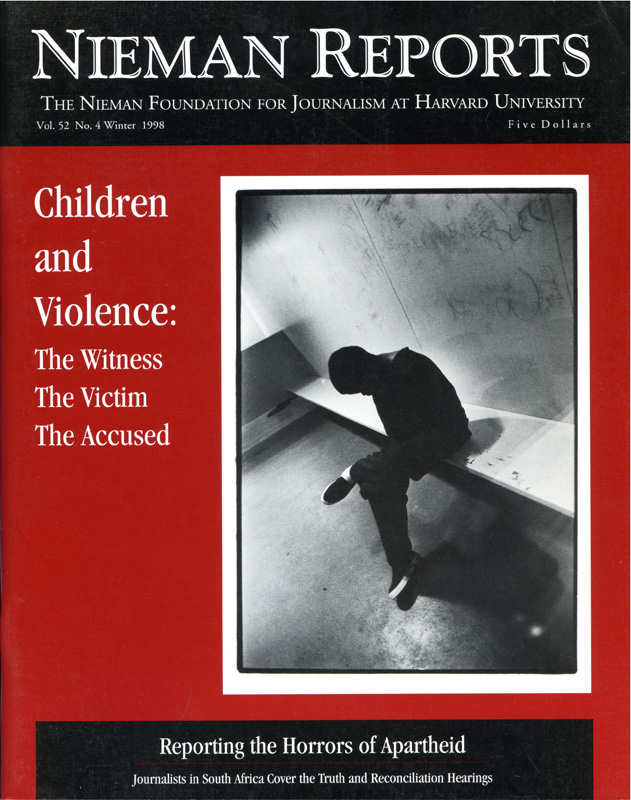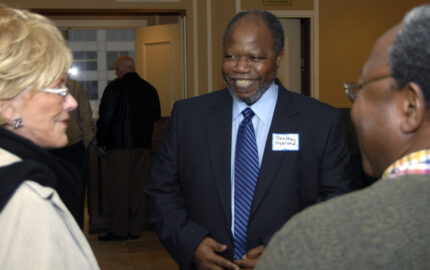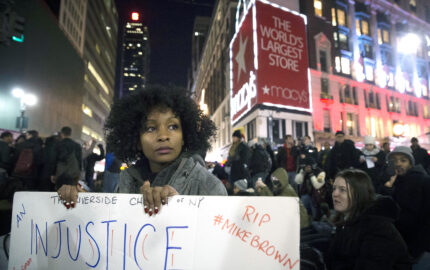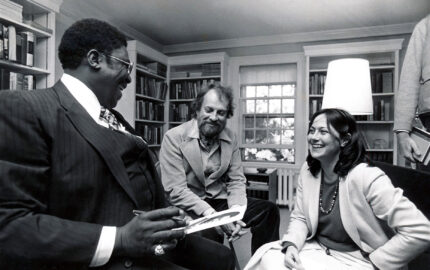After spending nearly 30 years encased in the self-absorption of Washington and international reporting as a diplomatic reporter for the Associated Press and foreign correspondent for The Los Angles Times, there was something refreshing about being in a part of the country where newspapers weren’t so tightly focused on the arcane machinations of the East Coast establishment and caught up in the self-importance of the national media. This has been particularly true of the sordid Bill Clinton-Monica Lewinsky affair, coverage that I played a part in writing while I was working for my hometown paper, The Omaha World-Herald. (I left this job in mid-October after the executive editor who hired me was removed and the job I thought I was hired to do wasn’t there any longer.)
The World-Herald, a two-cycle paper with four editions, a daily circulation of a quarter-million and the nation’s highest readership penetration, certainly hasn’t ignored the story. But for the most part it has provided a restrained, balanced account of the affair and its related issues that has kept readers reasonably well informed without titillating or inflaming them.
In fact, if the letters to the editor—called the Public Pulse here—are any indication, the single-minded intensity of the national media’s coverage of the Clinton-Lewinsky matter has puzzled if not angered many Midwesterners, an emotion that includes members of the local press.
When Doyle McManus, the Washington Bureau Chief for The Los Angeles Times, was in Omaha recently, he met with a dozen or so World-Herald reporters and editors to discuss the coverage. After his amusing yet determined explanation of the pressures, conflicts and guesses that drove The Times’ often dense coverage of the story with its unrelenting attention to sexual details and inside political manipulations, McManus was questioned with something less than understanding and acceptance of his position.
“What, have you guys gone nuts?” was the way McManus summed up our questions. “I was dumbfounded,” he said later, “to find that reporters were acting just like Nebraskans.”
The World-Herald is a conservative newspaper, largely reflecting its readership and the region, highly suspicious of all things Washington and reluctant to expand its role beyond that of a community-oriented newspaper. It is seriously understaffed, still runs routine “local boy makes good” stories on the front page, and its publisher openly involves himself in controversial policy issues, including injecting himself into political campaigns.
At the same time, Nebraska’s economy is heavily involved in international trade, and the paper makes good if limited use of The New York Times, Los Angeles Times, Washington Post and Knight-Ridder news services. The front page usually carries the major national and international developments of the day, though many of what other papers might judge as important stories are reduced to inside briefs.
Editorially, The World-Herald is adamantly and often angrily opposed to the President, again reflecting that in this state the vote twice went heavily against Clinton, giving him only 29 percent support in 1992. Still, while expressing disgust over Clinton’s involvement with Lewinsky and condemning his evasions and lies in dealing with the affair, the editorial board declined to join several of the state’s more liberal papers in calling for his resignation or removal. Instead it argued that his fate should be decided by the impeachment process.
With the exception of the truly important turns in the coverage, The World-Herald’s editors generally have limited front page coverage to a single story about this topic, usually a down-the-middle AP account, and then only if the coverage actually moved events along or marked an obviously serious development. “We decided early on not to put every turn of the screw on page one every day,” said Jeffrey Gauger, The World-Herald’s Assistant Managing Editor for News.
As to the sometimes prurient content of the national reporting, “the decision was that we would not print things that went over the barrier of good taste,” Gauger said, although acknowledging that making this decision was often a matter “of knowing it when we saw it” rather than going by some objective standard.
The only time the question of taste versus reporting was an issue, Gauger said, was in deciding what to publish from the Starr report itself on Saturday, September 12th. Our main front-page story was picked up from The Washington Post with a Los Angeles Times Clinton reaction piece accompanying it. Other sidebars and excerpts from the report, along with spillover from our front page stories, took up five pages inside. Words or descriptions deemed unnecessarily coarse were excised or substituted for “less offensive” phrases, Gauger said. While the paper itself used only excerpts, the full text of the report was carried by The World-Herald’s new Web site. The newspaper moved up the site’s formal debut to display Starr’s findings.
In an effort to balance coverage against Saturday’s focus on the Starr report, on Sunday we led with a New York Times story about Clinton’s plans to fight back. The front page also carried a story I wrote on the impeachment process and an item from The World-Herald’s Washington bureau on Senator Bob Kerrey’s views. Other related stories took up two inside pages.
If The World-Herald generally showed restraint and avoided much of the speculative punditry and questionable taste of some other media outlets, it also experienced a few lapses. The editors were very interested in children’s reaction to both the Clinton-Lewinsky situation and the language used in the coverage. Two front page stories—one of which I wrote—were assigned to explain oral sex and its various euphemisms to youngsters.
It is difficult to generalize about The World-Herald’s Clinton-Lewinsky coverage. Part of it certainly reflects a conservative society that perceives itself as preserving traditions of civility and modesty in a nation increasingly driven by crassness and vulgarity. There also is a sense that the Washington-New York based media are far too self-absorbed and have lost track of the economic, political and cultural issues that matter in what Nebraskans like to call the heartland. All in all, McManus was probably right—The World-Herald editors and reporters “were acting just like Nebraskans.” Kenneth Freed is a 1978 Nieman Fellow.
The World-Herald, a two-cycle paper with four editions, a daily circulation of a quarter-million and the nation’s highest readership penetration, certainly hasn’t ignored the story. But for the most part it has provided a restrained, balanced account of the affair and its related issues that has kept readers reasonably well informed without titillating or inflaming them.
In fact, if the letters to the editor—called the Public Pulse here—are any indication, the single-minded intensity of the national media’s coverage of the Clinton-Lewinsky matter has puzzled if not angered many Midwesterners, an emotion that includes members of the local press.
When Doyle McManus, the Washington Bureau Chief for The Los Angeles Times, was in Omaha recently, he met with a dozen or so World-Herald reporters and editors to discuss the coverage. After his amusing yet determined explanation of the pressures, conflicts and guesses that drove The Times’ often dense coverage of the story with its unrelenting attention to sexual details and inside political manipulations, McManus was questioned with something less than understanding and acceptance of his position.
“What, have you guys gone nuts?” was the way McManus summed up our questions. “I was dumbfounded,” he said later, “to find that reporters were acting just like Nebraskans.”
The World-Herald is a conservative newspaper, largely reflecting its readership and the region, highly suspicious of all things Washington and reluctant to expand its role beyond that of a community-oriented newspaper. It is seriously understaffed, still runs routine “local boy makes good” stories on the front page, and its publisher openly involves himself in controversial policy issues, including injecting himself into political campaigns.
At the same time, Nebraska’s economy is heavily involved in international trade, and the paper makes good if limited use of The New York Times, Los Angeles Times, Washington Post and Knight-Ridder news services. The front page usually carries the major national and international developments of the day, though many of what other papers might judge as important stories are reduced to inside briefs.
Editorially, The World-Herald is adamantly and often angrily opposed to the President, again reflecting that in this state the vote twice went heavily against Clinton, giving him only 29 percent support in 1992. Still, while expressing disgust over Clinton’s involvement with Lewinsky and condemning his evasions and lies in dealing with the affair, the editorial board declined to join several of the state’s more liberal papers in calling for his resignation or removal. Instead it argued that his fate should be decided by the impeachment process.
With the exception of the truly important turns in the coverage, The World-Herald’s editors generally have limited front page coverage to a single story about this topic, usually a down-the-middle AP account, and then only if the coverage actually moved events along or marked an obviously serious development. “We decided early on not to put every turn of the screw on page one every day,” said Jeffrey Gauger, The World-Herald’s Assistant Managing Editor for News.
As to the sometimes prurient content of the national reporting, “the decision was that we would not print things that went over the barrier of good taste,” Gauger said, although acknowledging that making this decision was often a matter “of knowing it when we saw it” rather than going by some objective standard.
The only time the question of taste versus reporting was an issue, Gauger said, was in deciding what to publish from the Starr report itself on Saturday, September 12th. Our main front-page story was picked up from The Washington Post with a Los Angeles Times Clinton reaction piece accompanying it. Other sidebars and excerpts from the report, along with spillover from our front page stories, took up five pages inside. Words or descriptions deemed unnecessarily coarse were excised or substituted for “less offensive” phrases, Gauger said. While the paper itself used only excerpts, the full text of the report was carried by The World-Herald’s new Web site. The newspaper moved up the site’s formal debut to display Starr’s findings.
In an effort to balance coverage against Saturday’s focus on the Starr report, on Sunday we led with a New York Times story about Clinton’s plans to fight back. The front page also carried a story I wrote on the impeachment process and an item from The World-Herald’s Washington bureau on Senator Bob Kerrey’s views. Other related stories took up two inside pages.
If The World-Herald generally showed restraint and avoided much of the speculative punditry and questionable taste of some other media outlets, it also experienced a few lapses. The editors were very interested in children’s reaction to both the Clinton-Lewinsky situation and the language used in the coverage. Two front page stories—one of which I wrote—were assigned to explain oral sex and its various euphemisms to youngsters.
It is difficult to generalize about The World-Herald’s Clinton-Lewinsky coverage. Part of it certainly reflects a conservative society that perceives itself as preserving traditions of civility and modesty in a nation increasingly driven by crassness and vulgarity. There also is a sense that the Washington-New York based media are far too self-absorbed and have lost track of the economic, political and cultural issues that matter in what Nebraskans like to call the heartland. All in all, McManus was probably right—The World-Herald editors and reporters “were acting just like Nebraskans.” Kenneth Freed is a 1978 Nieman Fellow.



